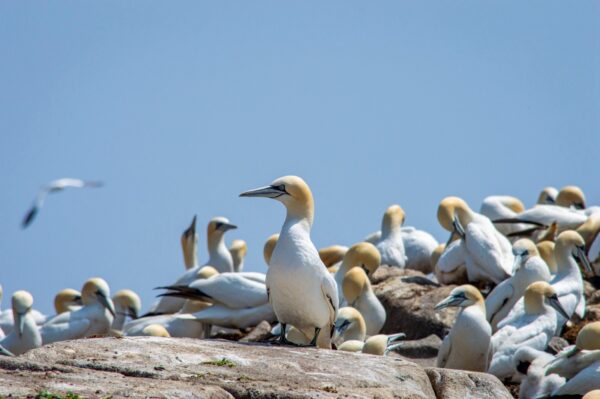OSPAR’s Quality Status Report 2023 showed that marine birds continue to be in trouble due to the effects of climate change and other pressures resulting from human activities such as mortality, habitat loss and degradation.
In direct response to this assessment countries from around the North-East Atlantic together with the European Union have adopted an action plan to reduce and eliminate the main pressures that arise from certain human activities that impact marine birds in the North-East Atlantic.
The Regional Action Plan for Marine Birds (RAP-Bird) was developed in consultation with stakeholders from the renewables, fisheries and conservation sectors, and identifies a series of important protection and conservation actions that support the achievement of OSPAR’s North-East Atlantic Environment Strategy 2030 to achieve biologically diverse and healthy seas, and which will help to halt the decline of marine birds.
The ambitious plan will initially deliver:
- Enhanced measures for marine birds: identifying and implementing actions to protect all marine bird species in trouble, including those that are not currently Listed as Threatened and/or Declining in the OSPAR area.
- Flyways scale conservation: addressing threats to migratory marine birds from factors outside the North-East Atlantic through a holistic approach and wider cooperation with international NGOs and conventions operating outside of the North-East Atlantic.
- Reduction of incidental bycatch of marine birds through measures adopted for all fishing gears, along with commitments to collate data and assess interactions between fishing and marine bird bycatch.
- Best practice for mitigation/compensation measures for offshore wind developments, recognising the potential for offshore wind developments planned in the OSPAR area to significantly impact marine birds across the North-East Atlantic.
- Measures to protect breeding colonies from invasive predatory mammals and to restore safe nesting habitats.
The RAP-Bird also includes actions that will identify important foraging and breeding areas, enhance data collection, monitoring and assessment, enhance resilience to climate change, and ensure effective monitoring of and response to Highly Pathogenic Avian Influenza (‘bird flu’) and other emerging diseases.
The OSPAR Commission was set up by the 1992 OSPAR Convention for the Protection of the Marine Environment of the North-East Atlantic, which unified and updated the 1972 Oslo and 1974 Paris Conventions. It brings together the governments of Belgium, Denmark, Finland, France, Germany, Iceland, Ireland, Luxembourg, the Netherlands, Norway, Portugal, Spain, Sweden, Switzerland and the United Kingdom, together with the European Community.
Dr Matt Parsons of the United Kingdom’s Joint Nature Conservation Committee who helped formulate the RAP-Bird and will lead the action on flyways-scale conservation said that “There is sound scientific evidence that the documented declines in many of our marine birds are the result of human activities. The good news is that through international collaboration – such as this ambitious OSPAR action plan – we can join forces across the region to apply our knowledge to improve the fortunes of these iconic species and the ecosystems they rely on.”
